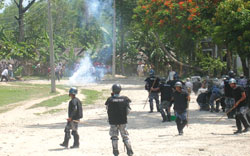|
|
| SMOKE SIGNALS: Different factions are taking advantage of the poor security situation and confusion about resettlement in the camps. |
The third-country resettlement plan for Bhutani refugees has been stalled due to fear and intimidation in the camps. The Home Ministry sent its directive approving the plan to Jhapa last week, but the International Organisation of Migration (IOM), which will administer the process, has not yet set up an office in Jhapa.
Following the riot last month during the attempted 'long march home', debate in the camps has died down, largely due to the strong-arm tactics of the Bhutan Communists Party-Marxists Leninists and Maoists (BCP-MLM). Ordinary refugees tell us they are scared to speak out for fear of retaliation and so publicly are noncommittal about the resettlement plan, where even a month ago there was spirited discussion (\'Long way home,\' #353). A recent report by the New York-based Human Rights Watch (HRW) says refugees risk being castigated by the group for not being patriotic enough or diluting the prospect of repatriation. A UNHCR official in Jhapa says many now refuse to speak even in private.
In a meeting with Foreign Minister late last month refugee leader Ratan Gazmere, who has spoken in favour of repatriation, asked the government to intervene to prevent the security situation from further sliding. Both the Nepal head of UNHCR Abraham Abraham and Home Ministry spokesman Daman Nath Neupane say things are gradually improving. The government is to marginally increase the presence of security forces around the camps next week, says Neupane.
In May, the BCP-MLM manhandled Hari Adhikari Bangale, chairman of the Refugees Durable Solution Coordination Committee, for making pro-resettlement statements. The group was briefly in the news in mid-2004 when one refugee was arrested with a pistol. The group claims to have hundreds of members inside Bhutan and in the camps. Last month Bhutan's official daily Kuensel reported the arrest of 30 people charged with providing training in the use of arms and explosives to start an armed communist rebellion in Bhutan.
Observers in Damak say that anti-resettlement groups such as the BCP-MLM are playing on genuine concerns among the refugee community about life in a third country. In the camps, rumours are spreading that leaders in favour of resettlement have made backdoor deals with the US government for favours in return for quieting criticism of the Bhutani government. Some refugees are even told that they will be killed once they are in America.
About 70,000 refugees are to be resettled in the United States, Canada, Australia, and Norway over the next five years. The political leadership among the refugees hold to the line that repatriation with dignity must be the priority, though some concede that many refugees would opt for third-country resettlement. "We cannot stop those who want to go to a third country, but as Bhutani citizens we should first insist on our right to return," says Tek Nath Rijal.
Bill Frelick, refugee policy director at HRW, says. "Until the government of Bhutan is ready to guarantee the rights of returnees, repatriation cannot be promoted as a durable solution for the Bhutanese refugees in Nepal," he said recently.
Supporters of resettlement point out that this would be a temporary move, as the right to return will remain sacrosanct. Opponents argue that political momentum will be lost once the refugees are dispersed.
The fight to hold Bhutan accountable for its previous and any future depopulation exercise and promises of democracy will benefit when refugees move to western countries, instead of festering in the camps (\'Replacement population\', #348).
In the meantime, UNHCR and the governments that have offered to accept refugees wait for the government of Nepal to provide security in the camps and create conditions for the refugees to understand what resettlement does and and does not entail.
Related Articles
. No place like home
. Long way home
. Chased out by dragons
. Lhotshampa chargesheet
. Only one way home



